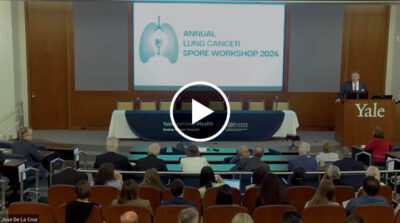In 1998, lung cancer was the leading cause of cancer deaths in the United States, with 160,000 deaths per year. That statistic inspired Matthew Meyerson, who would soon start working at the Dana-Farber Cancer Institute, to specialize in lung cancer.
“There was basically no effective systemic therapy,” Meyerson, now the Charles A. Dana Chair in Human Cancer Genetics at Dana-Farber and professor of genetics and medicine at Harvard Medical School, said at the 2024 Lung Cancer SPORE Workshop’s “tribute session” focused on the early days of understanding epidermal growth factor receptor mutations.
The workshop, hosted by Yale Cancer Center and Smilow Cancer Hospital June 12 – 13, was held in commemoration of the 20th anniversary of the discovery of EGFR mutation in lung cancer, which launched the era of personalized medicine in advanced non-small cell lung cancer, leading to a dramatic shift in treatment.
A recording of the session focused on history of discovery of EGFR mutations is available on the Cancer History Project.


Source: Yale Cancer Center
In the early 2000s, clinical trial results from the first EGFR-targeted therapies—gefitinib and erlotinib—pointed lung cancer researchers in a direction. Although the drugs led to small improvements in overall survival rates, some patients experienced dramatic responses.
During his presentation at the SPORE workshop session, Daniel Haber, director of the Mass General Cancer Center and the Krantz Family Center for Cancer Research, recalled a 2003 Boston Globe article about one such patient.
“She actually ended up living over 10 years after taking this magical drug called Iressa (gefitinib),” Haber said. “The question was, ‘Why does it work for her? Why does it not work for others?’”
Other researchers reported similar stories of patients quickly bouncing back after starting gefitinib or erlotinib—neither drug was FDA-approved at the time—in a so-called “Lazarus response.”
“The key thing for me as a translational scientist is really learned from the patients. I think we all were really tremendously impressed by the Lazarus type of responses that were occurring, and really trying to identify why that was happening,” said William Pao, CEO of Revelio Therapeutics Inc.
The race was on to get the answers.
At the same time, scientists’ knowledge of cancer was evolving. “What we were coming to understand at that time is that cancer is a disease of the genome—mutations, copy number changes, translocations, and infections,” Meyerson said.
In May and June 2004, two research papers published in the New England Journal of Medicine and Science converged: specific EGFR mutations drove some lung cancers, and those mutations could potentially predict who would respond to certain therapies. More papers came soon thereafter.
A guest editorial about the Lung Cancer SPORE Workshop by Yale’s Katerina Politi and Roy Herbst is available in this issue.
Watch the EGFR tribute session on the past on the Cancer History Project:


VIDEO: NCI Annual Lung Cancer SPORE Workshop 2024: EGFR – Past
By Yale Cancer Center, July 3, 2024
The 2024 Lung Cancer SPORE Workshop was chaired by Roy S. Herbst, MD, PhD, Ensign Professor of Medicine (Medical Oncology) and Professor of Pharmacology, Deputy Director, Yale Cancer Center, and Chief of Medical Oncology at Yale Cancer Center and Smilow Cancer Hospital, and Katerina Politi, PhD, Joseph A. and Lucille K. Madri Professor of Pathology.
The workshop included presentations from featured speakers, panel discussions, and posters sessions. Invited speakers in the field of lung cancer came from various institutions including Dana-Farber Cancer Institute/Harvard Medical School, The Ohio State University, Emory University, and UT Southwestern, among many others.
The first day of the event focused on the early days and the current landscape of research, treatment, and diagnosis in the EGFR and oncogene-driven lung cancer field as a whole, and also the future of the field and what can be done to move the needle for patients. For the EGFR tribute session on the past, speakers included:
- Roy Herbst, Yale Cancer Center
- Daniel Haber, Massachusetts General Cancer Center, Krantz Family Center for Cancer Research
- Matthew Meyerson, Dana-Farber Cancer Institute, Harvard Medical School
- William Pao, Revelio Therapeutics
- Lecia Sequist, Massachusetts General Cancer Center
This column features the latest posts to the Cancer History Project by our growing list of contributors.
The Cancer History Project is a free, web-based, collaborative resource intended to mark the 50th anniversary of the National Cancer Act and designed to continue in perpetuity. The objective is to assemble a robust collection of historical documents and make them freely available.
Access to the Cancer History Project is open to the public at CancerHistoryProject.com. You can also follow us on Twitter at @CancerHistProj, or follow our podcast.
Is your institution a contributor to the Cancer History Project? Eligible institutions include cancer centers, advocacy groups, professional societies, pharmaceutical companies, and key organizations in oncology.
To apply to become a contributor, please contact admin@cancerhistoryproject.com.







